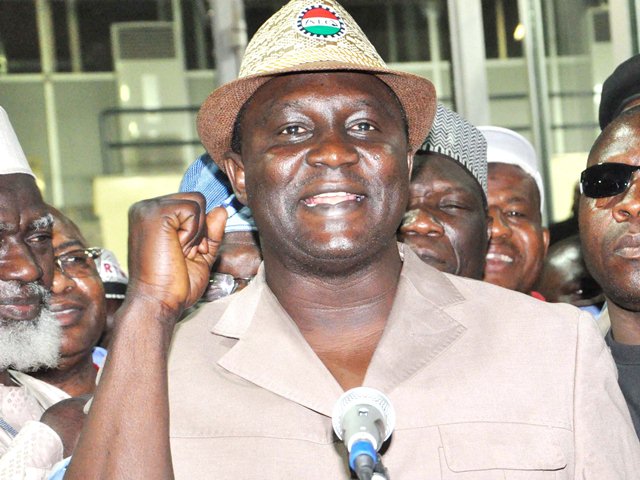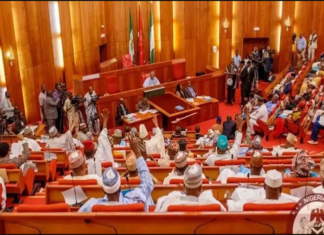Last Tuesday, the two powerful unions in the oil and gas industry called a wildcat indefinite nationwide strike. Their grouse was their suspicion that the giant regulator, Nigerian National Petroleum Corporation (NNPC), was unbundled. Without verifying the accuracy of their suspicion, Petroleum and Natural Gas Senior Staff Association of Nigeria (PENGASSAN) and National Union of Petroleum and Natural Gas (NUPENG) declared a nationwide strike. Data from Transmission Company of Nigeria (TCN) on Wednesday showed that peak power supply on the national grid fell to an abysmal 1,580.6MW. Meanwhile, power supply hit a new record peak of 5,074.7MW on February 4, 2016, the highest since it achieved the previous peak of 4,883.9MW on November 23, 2015.
TCN did not provide explanation for the precipitous plunge of power supply to 1,580.6 MW except vandalisation. In other words, was the vandalisation perpetrated by the usual criminal vandals seeking to make quick money at the expense of the rest of power consumers across the nation? Or by militants venting their anger on the passive infrastructure in the Niger Delta for real or imagined grievances? Or it was by the staff of the oil and gas sector who went on the nationwide strike called by PENGASSAN and NUPENG and decided to plunge the nation into total darkness.
Whatever the cause, the consequence of shutting down power supply by the saboteurs is predictably devastating to the entire population which relies on the meagre 5,074.7MW output from the national grid. And we would blame NUPENG and PENGASSAN for their blundering, thoughtless and reckless declaration of a nationwide strike the previous day.
Worse still, the unions called off the strike after 24 hours because they were wrong to assume that the sector regulator, the corrupt NNPC, was unbundled as a precursor to sacking some undeclared redundant staff of the corporation.
We want to make it clear to labour leaders that they have every right to call their members out on strike at any time… but as a last resort. They must explore all their legal conflict resolution mechanisms with their managements to resolve disputes through negotiation, arbitration and even adjudication before strike. Moreover, their right to withhold their services is seriously curtailed by the general public’s right to get the power supply services for which they paid the 11 Distribution companies (DISCOs).
Besides, the union leaders’ right to withhold their services does not subsume the right to vandalise equipment and barricade management executives like scabs from accessing company premises. Never mind if the managements decide to provide skeletal services which keep the equipment functioning during the fallow period.
A parallel scenario has played out at the privatised Ikeja Electricity Distribution Company (IKEDC) in Lagos. Since Saturday, residents of the state capital on IKEDC power network have been plunged into total darkness because of a paralysing strike called by Nigerian Union of Electricity Employees (NUEE). Consumers had to resort to fuelling and maintaining primitive, polluting, noisy and expensive generators to supply power for their businesses and domestic needs.
IKEDC was supplying power to consumers for at least eight to 12 hours a day in recent weeks which won it plaudits from consumers across the state. All of them it has suddenly plunged back into total darkness. Of the abysmal low national grid power of 1,580.6MW distributed on Wednesday by TCN to the 11 DISCOs nationwide, IKEDC was to receive 237.09MW but for its strike.
The privatised DISCOs’ managements are waking up to their responsibilities to meet their power supply obligations to consumers. Vexatiously, NUEE and its affiliate unions barricaded IKEDC’s offices since Tuesday, shut down Headquarters, Business Units and all its undertakings. The aggrieved unions’ disruptive actions stemmed from the sack of 400 staff, including a deputy president of NUEE. The management said its workers are not on strike, but the striking unions have barricaded the other staff out of its premises. Meanwhile, the only way it can provide excellent service to consumers is to first sack the 400 incompetent staff and recruit 603 new employees to boost its robust human capital.
We denounce the barricading of IKEDC by the aggrieved unions which chose to outsource their corporate failures onto all consumers who paid their hard-earned money as subscription fees for its services.
Indeed, it is high time the national and state assemblies amend the relevant labour laws to penalise the union executives with all damages caused by vandals and property thieves when unions unilaterally declare wildcat strikes and resort to destruction of corporate assets.
Obviously, Nigerian labour unions are caged in an employers’ market. The large army of unemployed graduates should make their employed counterparts and their unions aim at maximising efficiency in production and service delivery to grow and expand their businesses. In tandem, the wider economy would grow to hire more labour; the unions should not protect their selfish interest by shielding the drunks, the drug addicts, the incompetents, the unproductive and the inefficient staff as workers and union leaders.
Therefore, it makes no sense they call wildcat strikes which punish all consumers and the general public alike. Labour leaders and unions must learn to call incompetent and unproductive members of staff to order for the companies to flourish profitably before the managements resort to mass sack as a last resort – which the unions despise.













